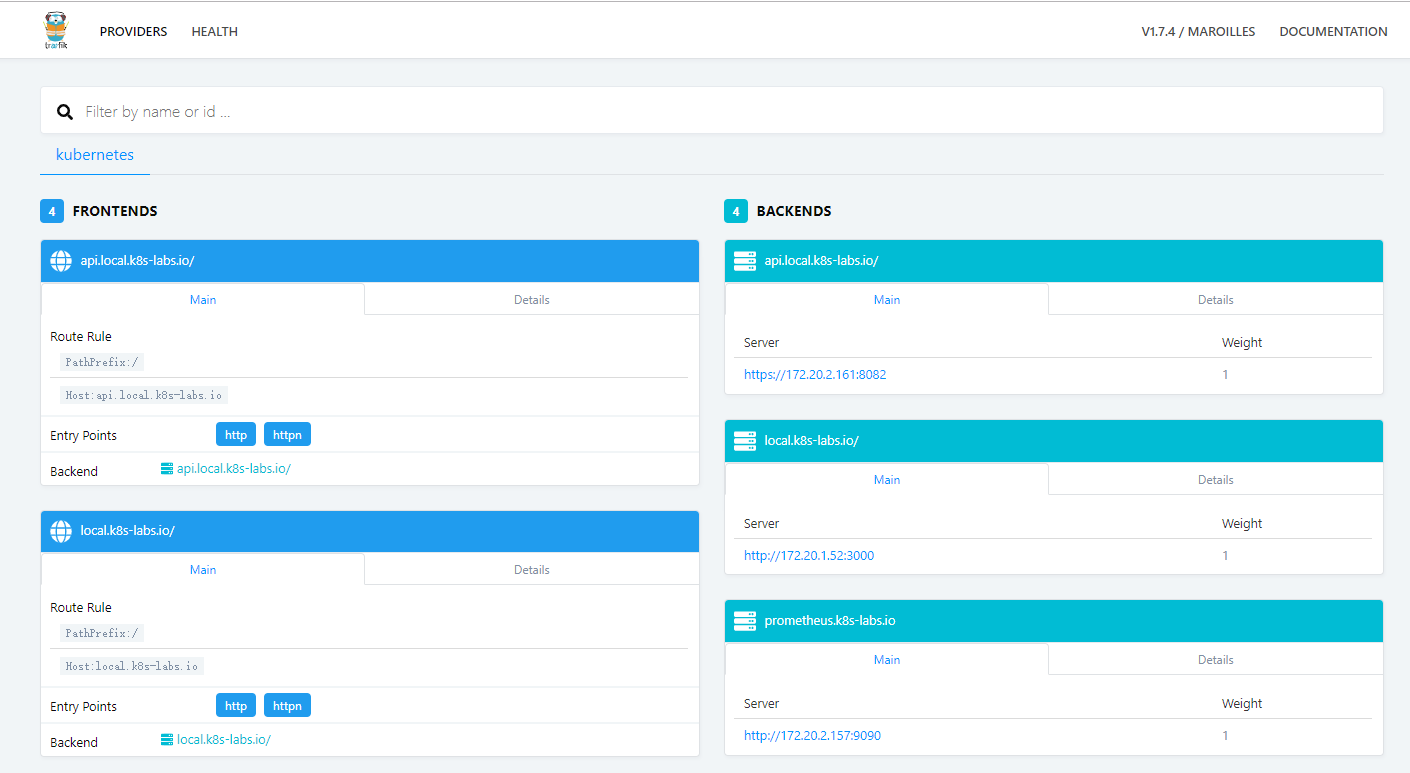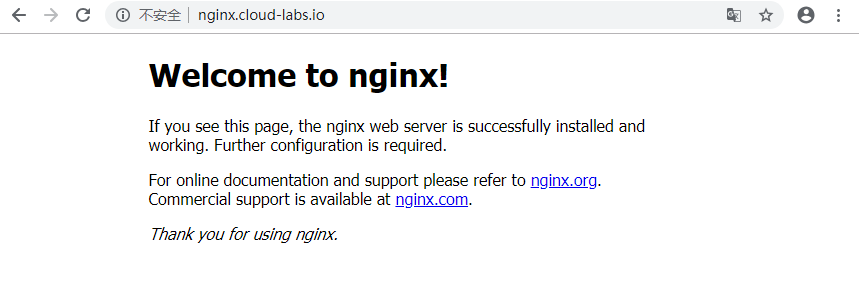
如上图,为称之为部署架构。用户使用域名通过LB访问部署在K8S上的应用,LB通过负载均衡反向代理暴露在NodePort上的Traefik服务,Traefik则在K8S内部使用域名发现K8S上通过Ingress暴露出来的应用。
部署Traefik
1
2
3
4
5
6
7
8
9
10
11
12
13
14
15
16
17
18
19
20
21
22
23
24
25
26
27
28
29
30
31
32
33
34
35
36
37
38
39
40
41
42
43
44
45
46
47
48
49
50
51
52
53
54
55
56
57
58
59
60
61
62
63
64
65
66
67
68
69
70
71
72
73
74
75
76
77
78
79
80
81
82
83
84
85
86
87
88
89
90
91
92
93
94
95
96
97
98
99
100
101
102
103
104
105
106
107
108
109
110
111
112
113
114
115
116
117
118
119
120
121
122
123
124
125
126
127
128
129
130
131
132
133
134
135
136
137
138
139
140
141
142
143
144
145
146
147
148
149
150
151
152
153
154
155
156
157
158
159
160
161
162
163
164
165
166
| ---
apiVersion: v1
kind: ConfigMap
metadata:
name: traefik
labels:
app: traefik
data:
traefik.toml: |
# traefik.toml
logLevel = "INFO"
defaultEntryPoints = ["http", "httpn"]
[entryPoints]
[entryPoints.http]
address = ":80"
compress = true
[entryPoints.httpn]
address = ":8880"
compress = true
[entryPoints.traefik]
address = ":8080"
[kubernetes]
[traefikLog]
format = "json"
[api]
entryPoint = "traefik"
dashboard = true
---
apiVersion: apps/v1
kind: Deployment
metadata:
name: traefik
labels:
app: traefik
spec:
replicas: 1
selector:
matchLabels:
app: traefik
release: traefik
template:
metadata:
annotations:
checksum/config: 55a29204986001f01835269242a08a68d59bc276658728cc28c5543e34f26d0b
labels:
app: traefik
spec:
serviceAccountName: traefik
terminationGracePeriodSeconds: 60
containers:
- image: traefik:1.7.4
name: traefik
resources:
requests:
cpu: "100m"
memory: "20Mi"
limits:
cpu: "100m"
memory: "30Mi"
readinessProbe:
tcpSocket:
port: 80
failureThreshold: 1
initialDelaySeconds: 10
periodSeconds: 10
successThreshold: 1
timeoutSeconds: 2
livenessProbe:
tcpSocket:
port: 80
failureThreshold: 3
initialDelaySeconds: 10
periodSeconds: 10
successThreshold: 1
timeoutSeconds: 2
volumeMounts:
- mountPath: /config
name: config
ports:
- name: http
containerPort: 80
protocol: TCP
- name: httpn
containerPort: 8880
protocol: TCP
- name: https
containerPort: 443
protocol: TCP
- name: dash
containerPort: 8080
protocol: TCP
args:
- --configfile=/config/traefik.toml
volumes:
- name: config
configMap:
name: traefik
---
apiVersion: v1
kind: Service
metadata:
name: traefik
labels:
app: traefik
annotations:
spec:
type: NodePort
selector:
app: traefik
release: traefik
ports:
- port: 80
name: http
targetPort: http
- port: 443
name: https
targetPort: httpn
---
kind: ServiceAccount
apiVersion: v1
metadata:
name: traefik
---
kind: ClusterRole
apiVersion: rbac.authorization.k8s.io/v1
metadata:
name: traefik
rules:
- apiGroups:
- ""
resources:
- pods
- services
- endpoints
- secrets
verbs:
- get
- list
- watch
- apiGroups:
- extensions
resources:
- ingresses
verbs:
- get
- list
- watch
- apiGroups:
- extensions
resources:
- ingresses/status
verbs:
- update
---
kind: ClusterRoleBinding
apiVersion: rbac.authorization.k8s.io/v1
metadata:
name: traefik
roleRef:
apiGroup: rbac.authorization.k8s.io
kind: ClusterRole
name: traefik
subjects:
- kind: ServiceAccount
name: traefik
namespace: kube-system
|
1
| $ kubectl apply -f traefik-rbac.yaml -n traefik
|
1
2
3
4
5
6
7
8
9
10
11
12
13
14
15
16
17
18
19
20
21
22
23
24
25
26
27
28
29
30
31
| ---
apiVersion: extensions/v1beta1
kind: Ingress
metadata:
name: traefik-dashboard
labels:
app: traefik
annotations:
spec:
rules:
- host: traefik.cloud-labs.io
http:
paths:
- backend:
serviceName: traefik-dashboard
servicePort: 80
---
apiVersion: v1
kind: Service
metadata:
name: traefik-dashboard
labels:
app: traefik
annotations:
spec:
selector:
app: traefik
release: traefik
ports:
- port: 80
targetPort: 8080
|
1
| $ kubectl apply -f traefik-ui.yaml -n traefik
|
LB
这边将使用nginx作为LB,使用其的反向代理,将请求反向代理到traefik所在的NodePort上,nginx配置default.conf如下:
1
2
3
4
5
6
7
8
9
10
11
12
13
14
15
16
17
18
19
20
21
22
23
24
25
26
27
28
29
30
31
32
33
34
35
| upstream k8s {
server 192.168.100.100:30080;
server 192.168.100.101:30080;
server 192.168.100.102:30080;
}
server {
listen 80;
server_name cloud-labs.io;
#access_log logs/quancha.access.log main;
#error_log logs/quancha.error.log;
root html;
index index.html index.htm index.php;
## send request back to apache ##
location / {
proxy_pass http://k8s;
#Proxy Settings
proxy_redirect off;
proxy_set_header Host $host;
proxy_set_header X-Real-IP $remote_addr;
proxy_set_header X-Forwarded-For $proxy_add_x_forwarded_for;
proxy_next_upstream error timeout invalid_header http_500 http_502 http_503 http_504;
proxy_max_temp_file_size 0;
proxy_connect_timeout 90;
proxy_send_timeout 90;
proxy_read_timeout 90;
proxy_buffer_size 4k;
proxy_buffers 4 32k;
proxy_busy_buffers_size 64k;
proxy_temp_file_write_size 64k;
}
}
|
配置hosts
1
2
3
| $ cat /etc/hosts
192.168.100.100 traefik.cloud-labs.io
|
验证
打开浏览器,输入traefik.cloud-labs.io可以看到如下:

部署一个应用
为了简单方便起见,我在这里将部署一个nginx,并使用域名nginx.cloud-labs.io来访问它。配置文件nginx-apps.yaml如下:
1
2
3
4
5
6
7
8
9
10
11
12
13
14
15
16
17
18
19
20
21
22
23
24
25
26
27
28
29
30
31
32
33
34
35
36
37
38
39
40
41
42
43
44
45
46
47
48
49
50
51
52
53
54
55
56
57
58
59
60
61
| ---
apiVersion: apps/v1
kind: Deployment
metadata:
name: nginx
labels:
app: nginx
role: web
spec:
replicas: 1
selector:
matchLabels:
app: nginx
template:
metadata:
labels:
app: nginx
spec:
containers:
- name: nginx
image: nginx:latest
imagePullPolicy: IfNotPresent
ports:
- name: http
containerPort: 80
protocol: TCP
- name: https
containerPort: 443
protocol: TCP
---
apiVersion: v1
kind: Service
metadata:
name: nginx
labels:
app: nginx
annotations:
spec:
type: ClusterIP
selector:
app: nginx
ports:
- port: 80
name: http
targetPort: http
---
apiVersion: extensions/v1beta1
kind: Ingress
metadata:
name: nginx
labels:
app: nginx
annotations:
spec:
rules:
- host: nginx.cloud-labs.io
http:
paths:
- backend:
serviceName: nginx
servicePort: 80
|
1
2
3
4
5
| $ kubectl apply -f nginx-apps.yaml
$ cat /etc/hosts
192.168.100.100 traefik.cloud-labs.io
192.168.100.100 nginx.cloud-labs.io
|
打开浏览器http://nginx.cloud-labs.io/:

结束语
一篇水文,到此结束,本文重点记录了在kubernetes上使用traefik作为ingress使用,不为别的,就是为了记录下。

